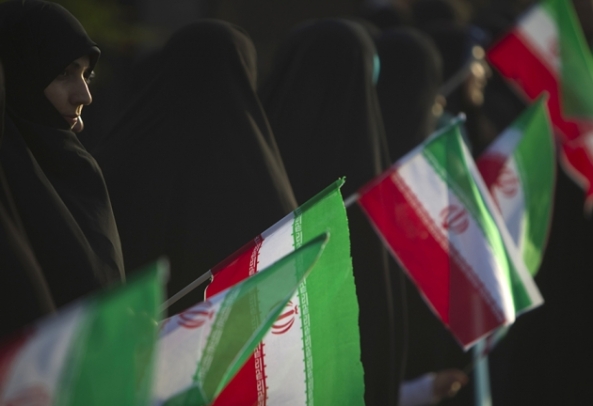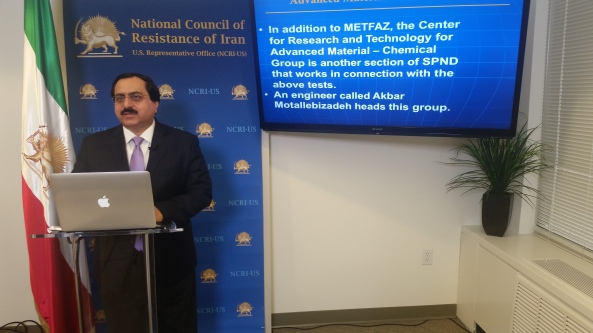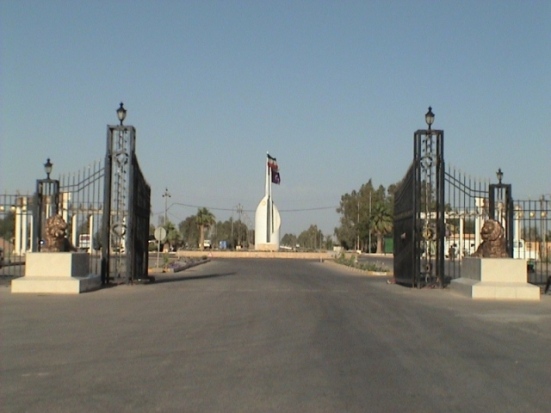CLICK HERE FOR ORIGINAL POST
by Raymond Tanter
The National Interest
September 16, 2011
Note: The author has not received any compensation whatsoever from the MeK or related groups.
 There is an escalating war for influence over U.S. policy toward Iran: It is a dispute among university scholars, think-tank analysts and former American officials. Reverberations of this war are not confined to the Washington beltway but have profound significance for the Middle East. As Arab republics like Egypt and Tunisia fall from popular protests, internally inspired regime-change scenarios abound. While largely peaceful protests brought down regimes in Cairo and Tunis, state suppression resulted in violent pushback in Libya, Syria and Yemen.
There is an escalating war for influence over U.S. policy toward Iran: It is a dispute among university scholars, think-tank analysts and former American officials. Reverberations of this war are not confined to the Washington beltway but have profound significance for the Middle East. As Arab republics like Egypt and Tunisia fall from popular protests, internally inspired regime-change scenarios abound. While largely peaceful protests brought down regimes in Cairo and Tunis, state suppression resulted in violent pushback in Libya, Syria and Yemen.
Although Arab republics are the immediate targets of their populations, Arab kingdoms like Bahrain, and to a much lesser degree Jordan and Saudi Arabia, are feeling the heat of popular unrest. Because there is generally a lack of consensus on how to transfer power in Arab republics, they are less stable than kingdoms. “The king is dead; long live the (new) king,” does not easily translate into “The president of the republic is dead; long live his son.”
Just as conflicts over succession occur among the Arab republics, so a succession crisis is likely to arise in the Islamic Republic of Iran. We should use the lens of such a conflict in Iran when viewing the war in Washington about an Iranian dissident organization—the Mujahedeen-e-Khalq (MeK). Saddam Hussein’s takedown by foreign militaries highlights the need for a homegrown antidote to Iranian rulers because external regime change is off the table in the aftermath of the Iraq War.
Secretary of state Hillary Rodham Clinton is poised to announce the MeK designation in fall 2011, a decision long overdue. Nothing is likely to be more decisive in reducing the strategic threat from Tehran than having a vigorous democratic opposition in Iran; it is critical to have a coalition of prodemocracy dissidents working together to weaken the regime from within and replace it; the MeK can play an enhanced role in the prodemocracy movement if it is removed from the State Department terrorist list. But above and beyond the potential international benefit of facilitating internal regime change for Iran, the MeK simply deserves to be delisted on the basis of facts and law alone.
A search of U.S. government and private electronic and media sources by scholars in the Iran Policy Committee reveals an absence of evidence to support the inference that the MeK engages in terrorist activities or terrorism or has the capability and intent to do so. The databases are: the U.S. Worldwide Incident Tracking System, which the National Counterterrorism Center no longer publishes; Department of Homeland Security-sponsored Global Terrorism Database; and U.S. government-supported RAND Database of Worldwide Terrorism Incidents. In these major databases, there are no confirmed associations of the MeK with any military action after 2001.
Given the absence of unclassified evidence of MeK involvement in terrorist activities during the course of nine years (2001-2010), any countervailing evidence in the classified record should be viewed with skepticism and subject to scrutiny for credibility. An assumption here is that terrorist incidents are too public not to appear in databases or in newspapers of record.
On 4 December 2008, the Court of First Instance of the European Communities issued a judgment annulling the MeK designation, and the European Union cleared the MeK of terrorist conduct in January 2009. The United Kingdom removed the group from its list of proscribed organizations in June 2008. In addition, the French judiciary dismissed all terrorism and terrorism-financing charges against the group in May 2011.
Two issues before the American court have been whether the State Department provided due process of law to the MeK and credibility of evidence in support of allegations against it. In a July 2010 ruling regarding a MeK appeal of its continued designation in January 2009, the U.S. Court of Appeals for the DC circuit faulted the decisionmaking process of the secretary of state.
The court questioned the credibility, sources and legal relevance of evidence in the Secretary’s January 2009 decision to maintain the designation and ordered the State Department to give the MeK an occasion to rebut some of the declassified material used in the re-designation. On 20 May 2011, the department released ten documents. Five were unclassified, mostly wire service reports from the Associated Press, Radio Farda and Azeri Press Agency. They concern allegations, such as MeK’s “cult-like” behavior and supposed lack of popular support within Iran. Such false, nonlegal allegations are no grounds on which to base a terrorist tag.
For the MeK to be re-designated absent any terrorist activity or terrorism, the State Department has to demonstrate that the group has both the capability and the intent to engage in terrorist activity or terrorism and that it either threatens U.S. national security or the security of American citizens.
In the Department of State Country Reports on Terrorism (CRT) 2007, 2008, 2009, 2010, and 2011, a CRT 2006 accusation that the MeK “maintain[s] the capacity and will to commit terrorist acts” does not recur. And there are no terrorist activities or terrorist events cited during the legally relevant period of two years prior to the last re-designation decision of January 2009. In fact, no such actions are alleged in Country Reports since 2001.
In view of the convergence of historical circumstances and the law in favor of delisting, consider the political origins of the MeK designation. The roots are in the Iran-Contra affair of the mid-1980s: In exchange for release of American hostages held in Lebanon by one of Tehran’s proxies, Hezbollah, the State Department alleged without evidence that MeK members used terrorism and violence as “standard instruments of their politics.” Thus began the use of that designation primarily as a tool to achieve foreign-policy aims rather than antiterrorism goals.
Martin Indyk, who served as assistant secretary of state for Near Eastern affairs in 1997, said one of the reasons the MeK was put on the terrorism list was part of a “two-pronged” diplomatic strategy. It included increasing pressure on Saddam Hussein by linking him to a “terrorist group,” the MeK. The other “prong” was the Clinton administration’s interest in opening a dialogue with Tehran. On 8 June 1997, Mohammad Khatami was elected president of Iran, and the administration viewed him as a moderate. Clinton officials saw cracking down on the MeK as a way to strengthen Khatami at the expense of so-called hardliners. But this political use of the terrorist designation failed; Tehran pocketed the concession without reciprocity.
Because law and facts converge for removing the designation of the MeK, those who oppose delisting fall back on political grounds buttressed by vague factual allegations for a continuation of the terrorist tag. There is an unfounded claim that the MeK is unpopular within Iran because of “numerous terrorist attacks against innocent Iranian civilians.” Then there is an invalid policy conclusion: “Removing the MeK from the Foreign Terrorist Organization [sic] list and misconstruing its lack of democratic bona fides and support inside Iran will have harmful consequences on the legitimate, indigenous Iranian opposition.” The allegation of MeK unpopularity is false. Support within the expatriate Iranian community suggests popularity in Iran; no other dissident organization can mobilize similar numbers of expat supporters.
Some who believe delisting would limit Washington’s ability to reach out to the Iranian street are wrong; the disproportionate number of protestors arrested and hanged because of association with the MeK indicates the organization’s significant presence on the Iranian street. Those who oppose delisting the MeK and hold a dim view of the effectiveness of Iranian dissidents to bring about regime change weaken their opposition to removal of the tag on the MeK. An argument in support of delisting on foreign-policy grounds is that it would reinforce the democratic opposition in Iran.
In most of the arguments opposed to delisting the MEK, no statutory fact is presented. So opponents of removing the terrorist tag resort to irrelevant non-legal arguments to overshadow lack of evidence of its engagement in terrorist activities or terrorism. In effect, those in favor of maintaining the MeK listing want Secretary Clinton to disregard the facts and the law entirely. With a simple signature delisting the group, Secretary Clinton would not only bring her Department in line with law and facts; she also would help empower the Iranian people to change the regime and open a political option between failed engagement and ineffective sanctions, on one hand, and problematic military action on the other.
Raymond Tanter served on the senior staff of the National Security Council and as personal representative of the Secretary of Defense to arms control talks in Europe in the Reagan-Bush administration. He is currently an adjunct professor at Georgetown University and a professor emeritus at the University of Michigan.
Image by Harald Dettenborn







